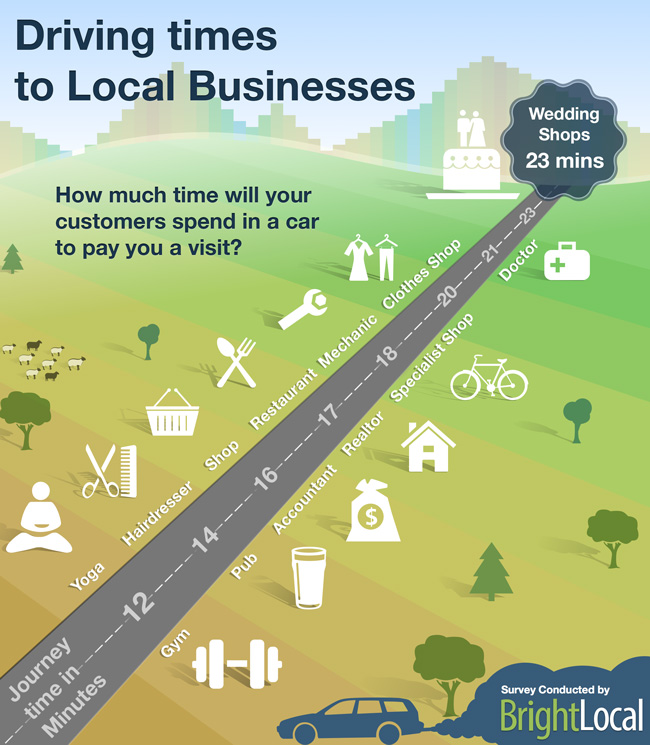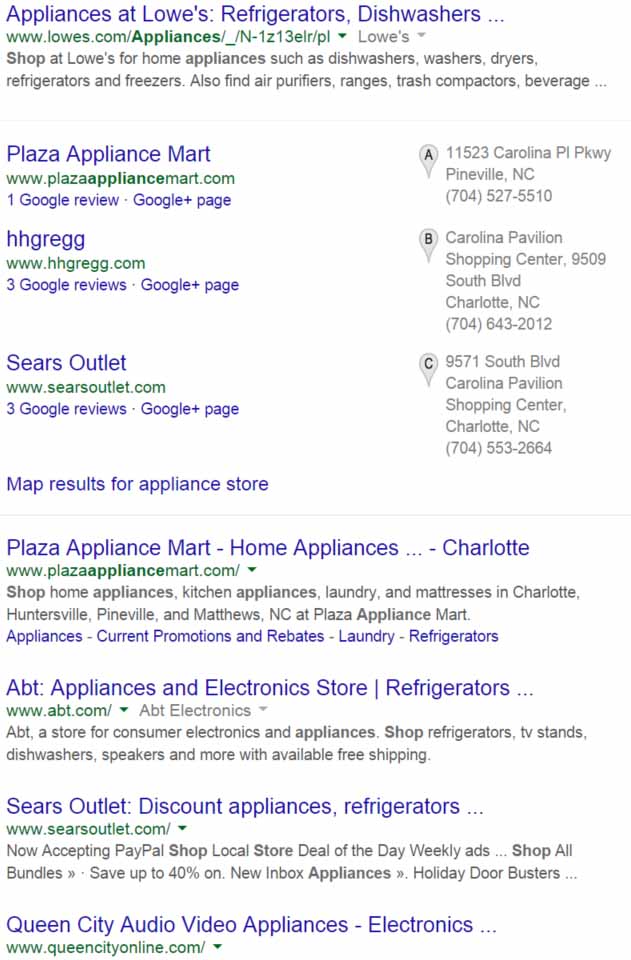![]()
For many business owners, there’s confusion about the differences between national SEO and local SEO. What are they, exactly? What strategy do you need? You might be asking yourself these questions. It’s hard enough to understand all of the technical aspects of search engine optimization without adding an extra layer of complexity in regard to national versus local strategies.
In an effort to clear things up in an easy-to-understand way, we’re going to tackle national and local SEO below.
Definitions of Local SEO & National SEO
Let’s start with simple definitions of local and national SEO. We’ll elaborate as we go, but, for now, it’s important to get a firm understanding of the basics.
- Local SEO: Driving website traffic and conversions for a specific location. Local SEO is service- and location-specific. Example: an Italian restaurant in Billings, MT.
- National SEO: Driving website traffic and conversions on a national level. National SEO focuses more on brand, not location or service. Example: Art of Tea
The Purpose of Search Engines Is to Provide Relevant Information
Results closer to the location of the user are more relevant!
The purpose of a search engine is to provide users with relevant information based on their individual queries. Over time, they’ve become great at doing just that. Location is a key component of providing relevant results.
Imagine this. You were planning on spending your afternoon at the Houston Rodeo, only to have your day cut short because of a bull’s swift kick to your leg. After you share a picture of your battle wound on Facebook, you proceed to Google “urgent care.”
Imagine that the results you see are for Austin, TX (remember, you’re in Houston). Are you going to drive four hours from Houston to Austin? Of course not! That search engine failed. Luckily for us, search engines adjust for this. But, it does show how important location can be for many businesses.
If search engines did not factor location into searches, imagine how chaotic your life would be. Imagine how long you would continue to use search engines. (Hopefully, you can see serving localized, relevant results is in the search engines best interest!)
What Kind of SEO Campaign Does Your Business Require?
All roads lead to local
The answer to this question can vary depending on your business goals and your product or service. But I’d argue that even businesses with national goals need to focus on many local SEO tactics (remember how search engines provide content localized to where the user is?).
Where does it make the most sense for your business to gain visibility? On a local stage or on a national level?
Factors to Consider in Local Search
- Local Search Is Quicker and Easier: Factors that impact search visibility are similar whether your goal is to rank locally or nationally. SEOs use optimized local citations (business directories), map listings and relevant content to increase visibility. Growing visibility in your local area, depending on your industry and market size, typically will take 3-6 months. (This is a moving target! Some businesses see quicker results and some keywords face more competition and can take longer.)
- Focus on Long Tail Keywords to Convert Higher and Penetrate Your Market More: There is no end to SEO. It’s an on-going process. You can penetrate your market more by focusing on long tail keywords that convert higher. What do I mean by long tail keywords? Take two search queries: “auto repair” vs “where can I get my transmission rebuilt quickly”. Which search term do you think is more likely to lead to business for your auto repair shop? Hint – The second one! The first search term could be from someone wanting to learn how to repair a car themselves or someone looking for a local repair shop, but the second search term is very specific. The user needs their transmission rebuilt (a hefty size job) and they need it done immediately.
- Less Authority: Gaining visibility in your local market is often quicker and easier, for newer companies specifically, because you don’t necessarily need as much domain authority (determined by age and quality of site). If your domain does not have much authority yet, it makes sense to focus on your geographic location to start a customer base.
- Less Competition: Similar to the authority factor, ranking in your local market is typically less competitive. You’re only trying to compete with the companies nearby who provide similar services, as opposed to competing with everyone everywhere that provides the same services.
- Search Engines Provide Local Results! AND Customers Will Only Drive So Far… We pointed this out earlier – but it bears repeating. Search results that are geographically close to the user are more relevant. In fact, Bright Local did a survey and identified how far users are willing to drive to get to a local business. Check this out!

Factors to Consider in National Search
- More Competition! If your goal is to rank your business nationally, you’re also going to face stiffer competition. You’ll be competing with all the companies who provide your services, as opposed to only those who service customers in your area.
- National Brands: You’ll also be competing with national brands like Walmart, eBay, Amazon and more, who have national sized budgets and marketing departments.
- More Complex & Comprehensive Marketing Services: Your national SEO campaign is likely to be part of a robust marketing campaign that can include a content strategy and paid advertising, along with all the local strategies you’d employ, like local citations and map listings. A longer time frame and a larger monthly budget is expected.
What Businesses Require National SEO?
In truth, relatively speaking, very few businesses need to utilize a national SEO campaign – and even then, ‘national’ SEO is really more of a hybrid that utilizes a number of local tactics along with a number of additional marketing strategies.
A Demonstration – Local vs National SEO in a Search Engine Results Page
 To the right you can see the search engine results page (SERP) for the query “appliance store”. As you look at the results you see a mixture of local and national brands.
To the right you can see the search engine results page (SERP) for the query “appliance store”. As you look at the results you see a mixture of local and national brands.
Here we see national and local SEO at work on the same page. There are three things to identify.
- Map Listings for a National Brand: In the maps listing we see “Sears Outlet”. This is a result of a national brand performing local SEO. They physically have a store in the Charlotte, NC area.
- Brand Authority: At the top of this list we have Lowe’s (a national brand). This is not a location specific listing, but they show up because of brand recognition and a national SEO campaign.
- Local Results: We can see local, non-national appliance stores including Plaza Appliance Mart, Abt and Queen City Audio Video Appliances. This is a result of local SEO strategies.
For the local businesses, focusing on local SEO makes sense. They only service people within a certain radius of their storefront, and customers will only drive so far for a new refrigerator. Also, these businesses are not shipping refrigerators from Charlotte, NC to Charleston, SC or even Raleigh, NC. There are appliance stores servicing those areas.
As for the national brands, Sears Outlet has done a good job. They show up in the map listing (local SEO) and in the organic results. Looking at Lowe’s we can tell that their national SEO strategy is strong (they are showing on page 1 #1) but their local SEO is lacking in this particular search because I’m not physically near a Lowe’s store.
Do You Need Anything Other Than Local SEO?
For most business owners, their ultimate goal is to grow their business and profitability over time. One way to do this is through increasing your market share by acquiring new customers.
Your first thought may be to expand the geographic area your business services. For some businesses, this may be a viable option, but for a many, this is not a great solution. Customers are only willing to travel so far for products and services. You may strain your overhead costs by providing high-quality services a greater distance from home base? Sure, it would be nice to say that your business is ranking on a statewide or national level; but what value does that bring our business? Ranking on a local level will be more beneficial to your bottom line.
We Focus on Local!
We focus on increasing visibility for businesses on a local level. We focus on long tail keywords that are more likely to convert based off of user intent. We realize that search engines show local results to users and aim to capitalize. If you’d like more information about our tactics, sign up for a free consultation.
.png)